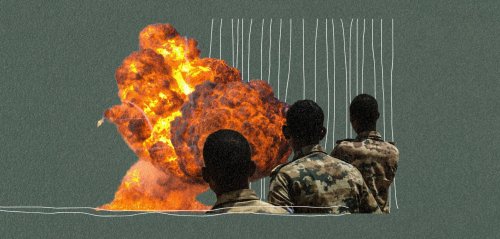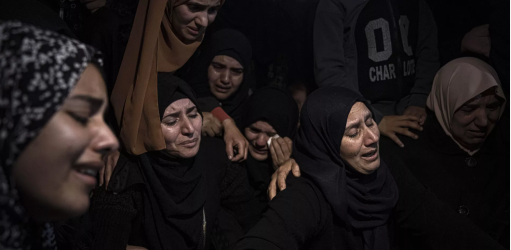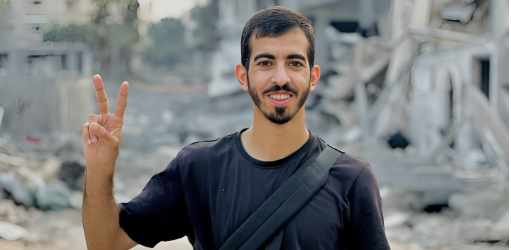This is a notification message.

The Qatar Press Center monitors the continued suffering of Sudanese journalists in light of the armed conflict that puts them in the crosshairs of both sides of the conflict. Local and international human rights organizations recorded many violations against them, as a number of journalists were subjected to arrest, threats, and attacks by members of both the Sudanese army and the Rapid Support Forces.
The conflict led to many journalists losing their jobs, as media institutions were forced to close their doors due to the destruction they sustained. According to the Sudanese Journalists Syndicate, more than 390 journalists were subjected to direct violations, including cases of physical assault and sexual assaults. The Syndicate also recorded 39 cases of kidnapping and arrest, and 28 cases of shooting targeting journalists.
The union indicated that some journalists were killed by Rapid Support Forces fire, while others fell as a result of shells that hit their homes. She noted that 6 journalists lost their lives during the conflict, including journalist Samaher Abdel Shafee, journalist Halima Idris, journalist Issam Hassan Morgan, journalist Issam Al-Haj, journalist Ahmed Youssef Arabi, and journalist Khaled Bilal. In the city of Damazin, journalist Siddiq Dalay was arrested by Army Intelligence, after he criticized the killing of one of his relatives in an article.
In the latest violations, journalist Samar Suleiman received threats from unknown persons after she left Khartoum for Kassala State.
Her photo was published on social media with false accusations that she supported the Rapid Support Forces or belonged to political parties. legal procedures In the same context, the Sudanese press is facing major restrictions, as in April 2024 the Sudanese authorities closed the offices of Al Arabiya, Al Hadath and Sky News channels, before the closure decision was reversed for Al Arabiya and Al Hadath channels, while the Sky News channel’s office remains closed.
The press faces additional challenges, as in April 2024, the Public Prosecution registered an indictment against journalists such as Sabah Muhammad Al-Hassan and Maher Abu Al-Joukh, on charges that carry a death sentence.
Continuous efforts
The current situation indicates that Sudanese journalists are facing the greatest challenges in many years. They have been forced to face violations and harassment from the warring parties, which greatly threatens freedom of the press in Sudan.
Despite threats and intimidation, journalists like Samar Suleiman continue to provide assistance to displaced people and work to raise awareness about peace and human rights issues.
While journalists suffer from these violations, the need to protect their rights and ensure freedom of the press remains an essential part of the international and local community’s efforts to end the conflict and achieve stability in Sudan. UNESCO position Last June 8, the United Nations Educational, Scientific and Cultural Organization (UNESCO) expressed its deep concern about the continued killing of journalists who either remained in Khartoum or fled to safer places, only to be later assassinated by the Rapid Support Forces.
Ms. Audrey Azoulay, Director-General of UNESCO, condemned the killing of two Sudanese journalists: Khaled Ballal in March 2024, and Halima Idris in October 2023. UNESCO continues to condemn the various attacks on journalists and the tragic conditions that led to the killing of more than 20 media professionals.
UNESCO
emphasized the crucial role of free and independent media in documenting and covering conflicts, noting that targeting journalists is not only a violation of their personal rights, but also an attack on freedom of the press and the public’s right to obtain information about events taking place in Sudan.
UNESCO confirmed that the conditions of journalists in Sudan have become more dangerous since the outbreak of war in April 2023. The Rapid Support Forces and other conflict factions have specifically targeted journalists, significantly reducing their ability to cover the conflict. As a result, many journalists have been forced to leave the country, often leaving behind their belongings and risking their lives in search of safety. Some of them were able to reach safer areas or neighboring countries, while others faced great difficulties in finding refuge.
The United Nations emphasized that targeting journalists has a chilling effect on the flow of information, making it increasingly difficult for the world to understand the extent of the conflict and its impact on civilians.
It is noteworthy that the military conflict in Sudan began on April 15, 2023, when clashes broke out between the Sudanese army and the Rapid Support Forces, which led to an escalation of battles and a severe humanitarian crisis in the country. The media sector was greatly damaged during that crisis, and male and female journalists in Sudan became the target of threats and attacks from... before the parties to the conflict.

تستقبل نساء غزة يوم الأم...

تواصل الآلة الإعلامية الإسرائيلية حربها...